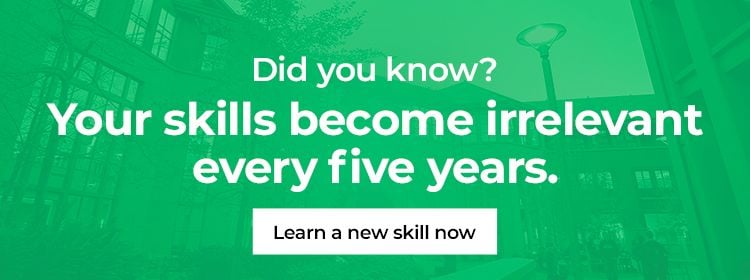Top Tips for Successful Career Planning in 2022

Rewarding careers don’t happen by chance. It takes effort – to plan, prepare and perform. With so many of us in recent months simply doing our best to stay resilient and employed, it’s finally time to be more proactive. Seize control of our career choices, and take steps to make our professional lives as worthwhile as possible. If you’re ready to set and fulfill your professional goals, these simple top tips for successful career planning in 2022 will help. Let’s take this step-by-step:
#1: Assess Yourself
Whether you’re hungry to make an immediate career move or gently preparing for what might come down the road, the first step is to make an honest judgment of your soft skills, personality strengths (and weaknesses), and technical competencies.
Ashwin Damera, co-founder of Emeritus, recommends a three-box framework to evaluate yourself and your potential in a changing job market.
1: Manage the present
2: Forget the past
3: Write the future
The first box contains your current accomplishments, personality traits, interests, and skills. What you’re doing today that’s good, useful, and marketable.
“Everybody has some superpower,” Damera says. “That’s your identity. That’s your strength. Play to it.”
Box 2 demands the unvarnished truth from you about skills or behaviors. Especially those that you might have leaned on in the past but will not find useful for your future. We all use legacy processes and relic thinking as a crutch. Primarily because it’s what we’ve always done. Box 2 allows you to let go of what’s not working now and pinpoint the traits that won’t work in the future. You cannot make yourself indispensable in the marketplace with obsolete ideas and skills.
Box 3 requires you to imagine the possibilities. What industry and what specific role aligns with your vision, values, goals, and competencies? This stage of your career planning requires you to be quite specific about the new skills you’ll need for your next career challenge.
When combined, the three boxes can help you chart a strong career path.
#2: Evaluate the Market
A proactive career development plan requires short-term insights and long-term planning. You’ll need to do some research to identify the jobs of the future in your industry, or the field you’re interested in. Governments, think tanks, and consultancies expend considerable resources in forecasting the future of work. Put their research to good use by reviewing white papers and reports on the subject.
SHRM used US government labor analysis to identify the top 10 growth occupations by 2030, with major expansion expected in medical fields, marketing, software development, management analysis, and operations.
In addition to reviewing broad predictions, study the specifics of your particular line of work, or the one on your radar. Certain fields are in decline and others are growing, sometimes in the same ecosystem. For instance, traditional banking is in decline. FinTech is booming. Consider transferrable skills for the new iteration of your current job or in a different field altogether.
Box 3 of the framework invites you to consider every possibility. Using the finance example again, you might apply your knowledge to anything from peer-to-peer lending apps to financial journalism to blockchain regulation. Pivot anywhere your interests take you as you do a good assessment of yourself and the market. But ground your dreams by evaluating the longevity of potential careers in the field and what it will take for you to succeed.
Chaitanya Kalipatnapu, the other co-founder of Emeritus, recommends researching a variety of roles in growing industries, paying particular attention to fields educators are emphasizing. “There will be a lot more courses that we will be coming out within the fields of data sciences, AI, cloud computing, sustainability,” he said. “And there will be more emphasis on communication, collaboration, resilience, and wellness,” he says.
#3: Identify the Gaps
Career planning often hinges on two gaps.
- Your personal skills gap: If there is white space between where you are and where you want to be, plan for a competency shift, training, certification, or proactive targeting of résumé-building experience. Look at this gap as an opportunity to re-create your career by developing skills for the role you want.
- A workforce skills gap: In many industries, employers have a need but there are not enough trained workers to fill some positions. Herein lies opportunity. The Manpower Group found 70% of employers globally faced difficulty in 2021 finding workers in high-demand areas such as manufacturing and production, IT, sales and marketing, and operations. While global trends are important, take a closer look at the skills status where you live and work:
EU
- 8.6 million people have a skills shortage in the following categories: technological skills, digital citizenship skills, classical skills
UK
- 1.5 million workers are under-skilled in at least one STEM workplace skill.
Asia
- The continent will see 149 million new jobs in technical and tech-enabled roles in software development, cloud, and cybersecurity by 2025 and not enough talent to fill them.
Latin America
- 50% of companies say job candidates lack the skills their firms need
Africa
- While the continent’s workforce will expand to more than the size of the workforce of the rest of the world combined by 2030, 87% of Africa’s CEOs are concerned about the availability of critical employee skills.
United States
- 77% of manufacturers say they will have difficulty attracting and retaining workers in the coming years.
Once you understand the overall state of workforce readiness, get more granular by researching your specific field – for instance, find where the skill gap exists in technology, marketing, or health care. And when you find a juicy statistic – EMSI named DevSecOps as the top skill of 2021 with a 221% increase in job postings – dive deep into the long-term outlook for the role, the pay relative to similar occupations, and the path to achieve the role.
When you have identified jobs with a skills need (roles that are also interesting to you), it’s time to act.
#4: Fill the Gaps
Conduct a personal gap analysis specific to the roles at the top of your list. As companies would do a SWOT analysis, you too can identify the skills a job requires and compare them to your actual skill set. This will help you narrow down your growth areas.
Luckily, most job postings over-explain the minutiae of a position, you’ll be able to understand the needs of the career and what you can deliver.
Ask yourself the following questions and chart your answers:
- Do I have the right skills and training for this role?
- Do I have the right work experience for this role?
- Can my indirect skills and experience transfer to this role?
- What additional training do I need to achieve this position?
In this final stage of your career planning – using all the three boxes – be systematic about pursuing your goal. 
“Whether it’s coaching, reflection, reading a book, or taking a course,” Damera says, “you need to make sure you’re actually working on improving yourself across all three boxes.”
If your career plan reveals a need for education and certification, ask your organization about its employee training reimbursement program. Half the companies are willing to train and develop their staff to fill open positions. According to ManPower Group nearly 80% of employees who have access to company-paid training are happier in their jobs.
In 2022, it pays to seek the best in professional training courses with the skills you need. Additionally, Emeritus offers online courses and programs from the world’s best universities. Browse our selection of coding bootcamps and full stack development courses, to AI and machine learning courses, and many more. These market-relevant courses will help shape your skills for the workforce of today and the workplaces of the future.
By Leigh Brown Perkins



